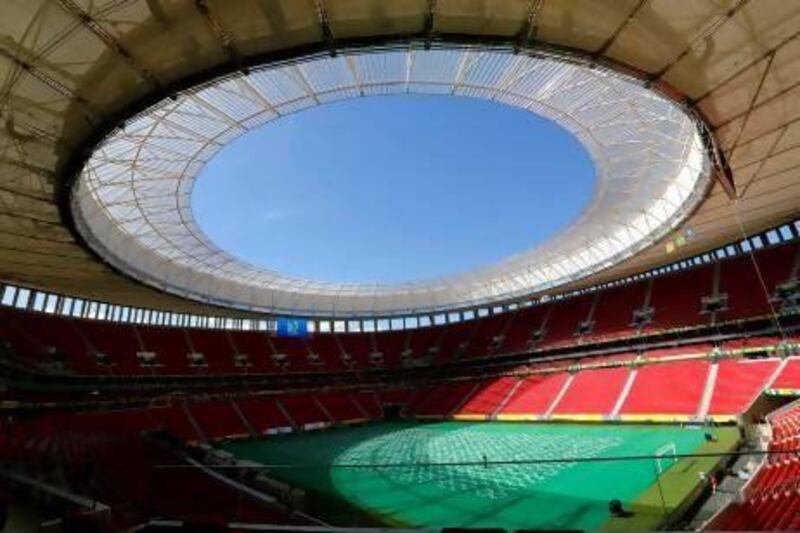In a football era dominated by power, politics and multimillion-dollar construction, Brasilia seems the perfect location to raise the curtain on this month's Fifa Confederations Cup.
The capital city, the epitome of urban planning, did not exist the last time Brazil hosted the World Cup, in 1950. Now it is home to the federal government, the country's national bank and more than two million residents. Brasilia is as purpose-built as the World Cup stadium that sits at its centre.
Designed by Brazil's most famous architect, Oscar Niemeyer, the city was officially born in 1960 following four years of construction. From above it resembles a bird in flight; from the ground it is a giant grid, with numbered blocks. At the bird's heart is the Estadio Nacional de Brasilia, a 71,000-seat arena that cost in excess of US$550m (Dh2 billion) and will host today's match between the hosts Brazil and Japan.
With solar panels set to generate energy to 2,000 homes and giant ducts designed to collect and reuse rainwater, Estadio Nacional is one of the most forward-thinking stadiums in the world. Yet after next summer's tournament, there are concerns it will become a monument to excess; a constant reminder of misspent money.
At a cost of close to double its initial budget, Estadio Nacional is the most expensive of all 12 arenas built or redeveloped for Brazil's global showpiece, the 2014 World Cup. And Brasilia is no footballing hotbed. The average attendance of the 12-team local league is less than 1,000 - the championship final attracted 970 spectators. Demand is so little one league match, between Legiao and Brazlandia, managed only 47 fans.
Critics say once Fifa's focus turns towards Russia next autumn, Brazil will be forgotten and there will be no need for a mega-stadium like that seen in Brasilia. Or, likewise, those under construction in Manaus, Cuiaba or Natal.
"Fifa comes here, sets up a state within our state and will leave here with $2-3 billion in profits," Romario, the former World Cup-winning footballer turned outspoken politician, told the BBC recently. "And then what? What about these white elephants, these stadiums, on which nearly $2bn have been spent? This money could have been spent on education, health - things that are much more important to our country."
When Brazil won the right to host the World Cup in 2007, the government immediately promised to spend big, quicken investment in infrastructure and accelerate social and economic development. However, despite going vastly over budget and spending $14.5bn, the majority of projects have faced numerous delays.
The Brazilian weekly Epoca published an article last month outlining five reasons why deadlines and budgets are continuously overlooked.
All five points had roots in the country's government, where corruption is rife, building plans are poorly detailed, bureaucracy is long-lasting and excess expenditure is permitted by law.
Only two of the six stadiums that will feature in this month's tournament were ready by Fifa's December cut-off date, and the sport's governing body had to back down on its demand that each venue host at least three test events. Brasilia's stadium and Estadio Maracana in Rio de Janeiro, which will host this month's final, have each held only one test event.
The redevelopment of the area around the Maracana has also been the source of controversy.
Not only has the cost ballooned from $350m to $600m, but the work also resulted in the closure of a nearby school and a face-off between police and indigenous protesters who had been squatting in a dilapidated building once home to Brazil's first Indian Museum.
Native Brazilians being sprayed with tear gas was not how the Maracana wanted to reintroduce itself to the public.
As well as stadium issues, transport remains a problem; none of the six venues this month are within a comfortable drive of each other. Internal flights are expensive and unreliable and the train line planned to link Rio with Sao Paulo in time for next year will not even be ready in time for Rio hosting the Olympic Games in 2016. On track, Brazil is not.
The country has also failed so far to clean up its serious crime problems, with a surge in gang rapes, murders and armed robberies gaining increasing international attention.
In the boardrooms, the behaviour is less than exemplary with the former chief of the Brazilian Football Federation (CBF), Ricardo Teixeira, resigning last year amid allegations of corruption. His replacement, Jose Maria Marin, has links to the country's military dictatorship of 1964-1985 and 55,000 people signed a petition demanding his removal.
Until recently, the belief was once the Confederations Cup starts, focus will switch to the passionate atmosphere inside the stadiums, but even that is now being questioned courtesy of high ticket prices, the introduction of numbered seating and the national team's unremarkable performances.
Last month, when Brazil unveiled the caxirola, the nation's answer to South Africa's notorious vuvuzela trumpet, fans threw the small maraca-like instruments on to the pitch in response to a poor performance from the host nation. The caxirola was soon after banned by the local organising committee.
The hope is the noises coming out of Estadio Nacional this evening will be more positive. Brazil's latest deadline is on Brasilia's door step.





